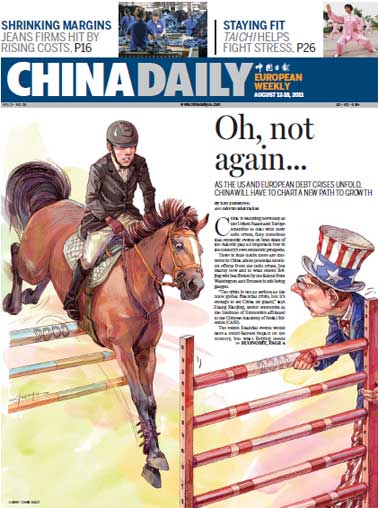Politics
Sarkozy, Merkel push euro integration
Updated: 2011-08-17 09:31
(Agencies)
![France's President Nicolas Sarkozy (R) shakes hands with German Chancellor Angela Merkel following a news conference at the Elysee Palace in Paris, August 16, 2011. [Photo/Agencies] Sarkozy, Merkel push euro integration](../../images/attachement/jpg/site1/20110817/0013729e48090fb554271f.jpg) |
|
France's President Nicolas Sarkozy (R) shakes hands with German Chancellor Angela Merkel following a news conference at the Elysee Palace in Paris, August 16, 2011. [Photo/Agencies] |
EURO IS A SET OF RULES
Sarkozy and Merkel - under pressure to convince markets the euro zone is sound or risk watching it unravel - said their first proposal was for "a real economic government" for the euro zone, with a president elected for two-and-a-half years.
"Germany and France feel absolutely obliged to strengthen the euro as our common currency and further develop it. And it is entirely clear that for this to happen, we need a stronger interplay of financial and economic policy in the euro zone," said Merkel, who went on to a working dinner with Sarkozy.
Sarkozy said that if adopted, their proposal that euro zone governments should enshrine deficit-limiting rules into their constitutions would be obligatory, not optional.
"The euro has allowed us a lot of economic progress but the euro is not just a right, it's a set of rules, a duty, a discipline," he said. "Consequently if the rule is to be adopted by the 17, it will not be an optional rule but obligatory."
While it was unclear how governments could be forced to adopt politically difficult constitutional changes, Sarkozy's tone suggested there would be no more tolerance for straying from rules and even raised the spectre of a two-speed union.
"TOO LITTLE TOO LATE?"
Officials in Paris and Berlin played down expectations ahead of Tuesday's meeting, saying euro bonds would not be on the agenda, but markets were still disappointed.
"Rather than the additional check-writing by core European governments that certain markets were looking for, including a new euro bond, they are getting a fiscal discipline golden rule, stronger economic governance, and a new financial transactions tax," said Mohamed el-Erian, co-chief investment officer at Pacific Investment Management Co in California.
The refusal to contemplate a euro bond at this stage is frustrating investors, who have seen Europe's response to the dragging crisis as too little too late. They see the common bond as the bloc's best chance of getting ahead of the curve.
Some analysts fear the European project could lose its way if domestic political pressures curb the ambitions of the leaders of France and Germany, the bloc's main political and economic powerhouse.
Merkel's own conservatives are strongly opposed to a second bailout of Greece according to a recent poll. Sarkozy, already facing a tough re-election battle next year, is having to push through austerity measures to convince markets France can retain its triple-A rating.
Sarkozy and Merkel had already planned to meet this week to discuss their proposals on euro zone governance, but the stakes were raised when French assets hit in last week's market rout.
Investors dumped shares in French banks, which are exposed to Italian debt, as rumours circulated - denied by rating agencies - that France's AAA-rating could be at risk.
That sell-off was evidence markets were not convinced by a July 21 deal to give new powers to the euro zone's EFSF rescue fund and for proposals to be made on closer economic governance.
Some still saw Tuesday's ideas boosting the euro, however.
"Sarkozy talks about common governance for the euro zone, which I think is one step closer toward a fiscal union. That's positive for the euro overall," said currency strategist Richard Franulovich at Westpac in New York.
E-paper

Going with the flow
White-collar workers find a traditional exercise helps them with the frustrations of city life
The light touch
Long way to go
Outdoor success
Specials

Star journalist remembered
Friends, colleagues attended a memorial service to pay tribute to veteran reporter Li Xing in US.

Robots seen as employer-friendly
Robots are not new to industrial manufacturing. They have been in use since the 1960s.

A prosperous future
Wedding website hopes to lure chinese couples
